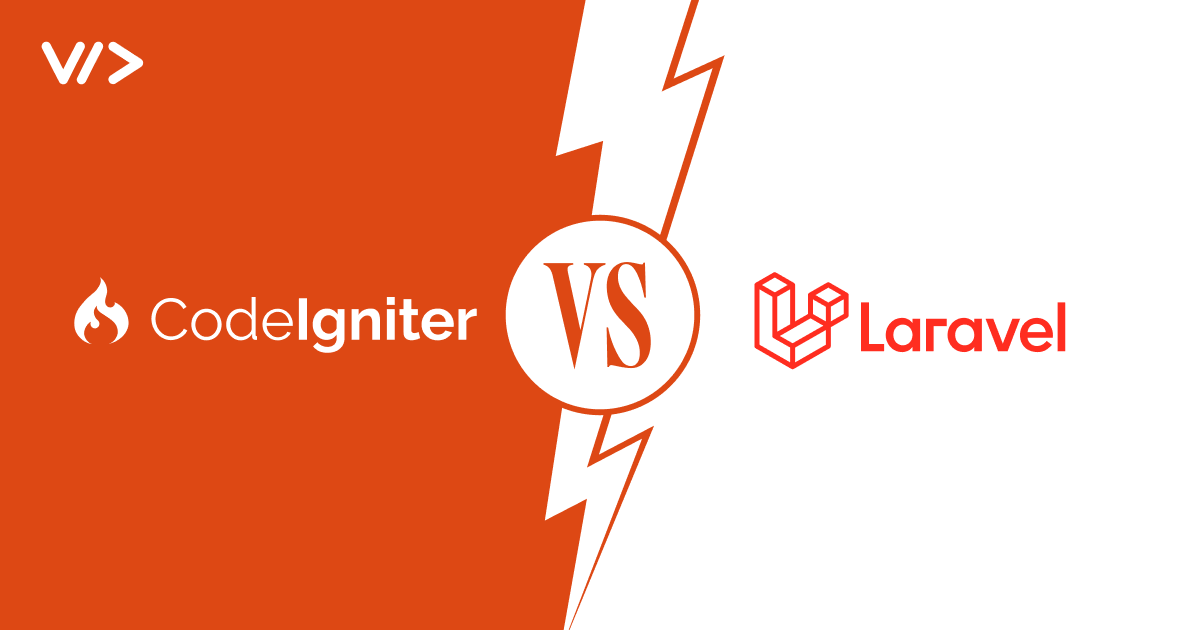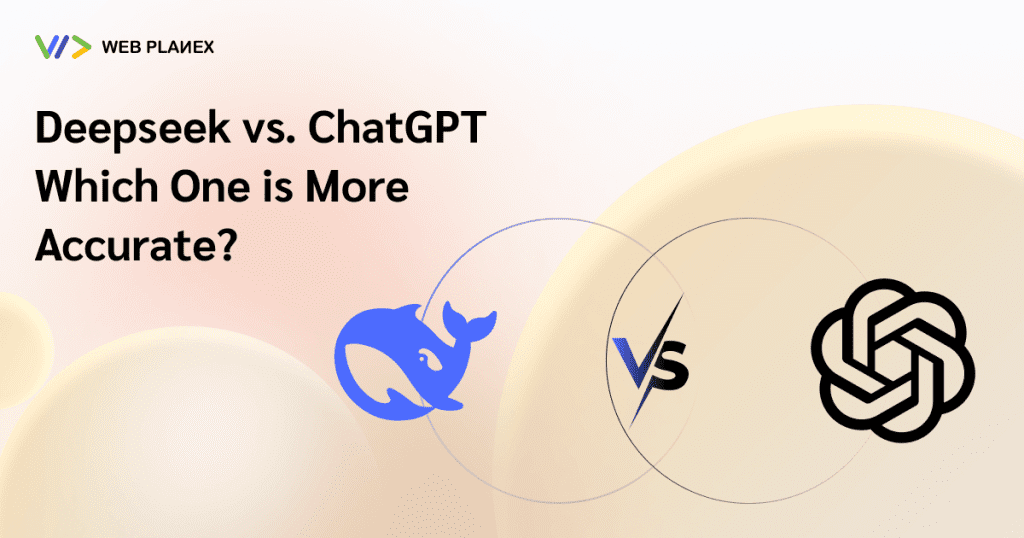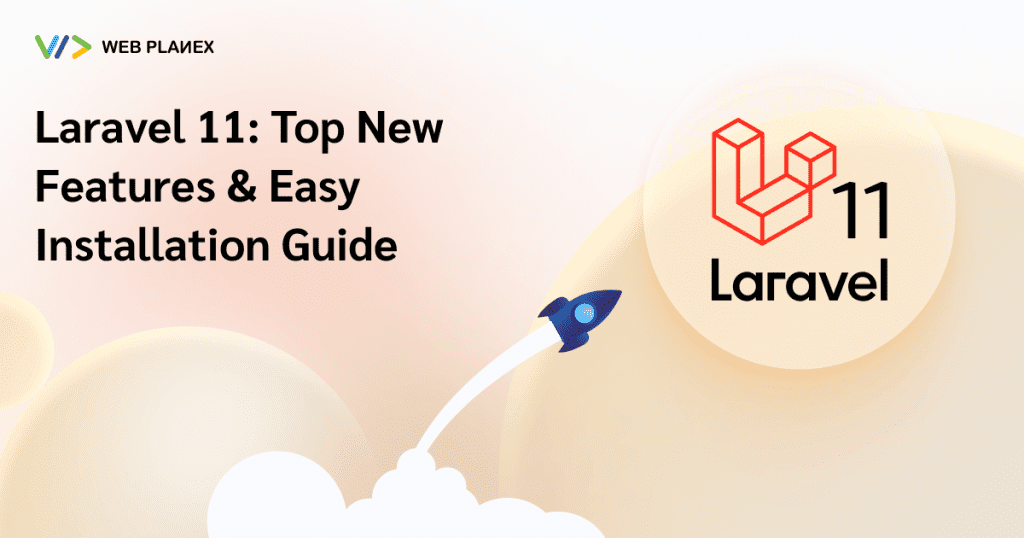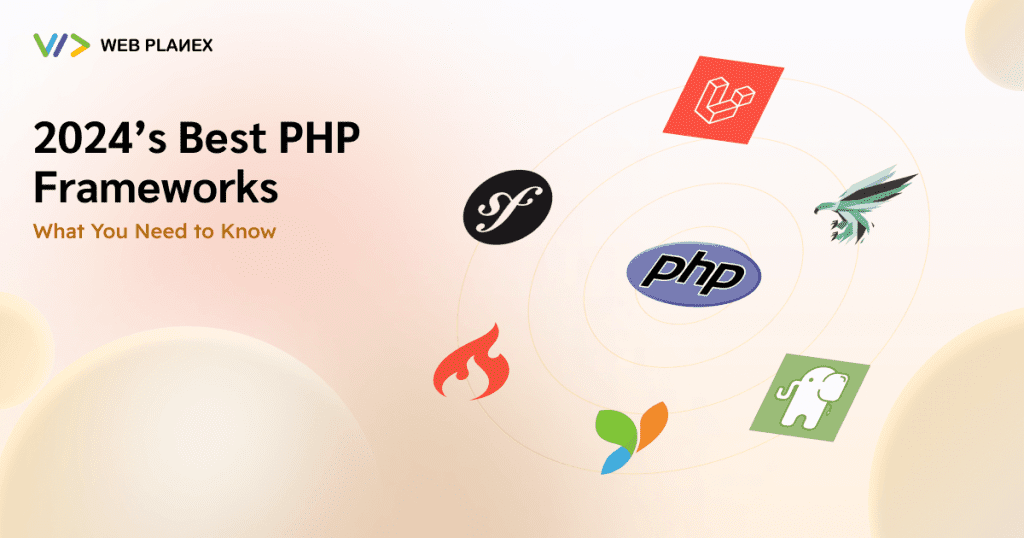
PHP is one of the most powerful programming languages to date. Approximately 77% of websites worldwide are managed by PHP according to W3Techs. Due to its scalability, several renowned websites like Facebook, Microsoft, and WordPress use PHP as their primary coding language to handle high traffic.
PHP offers various frameworks, that improve its robustness and scalability, simplifying the development process by eliminating the need to code from scratch and allowing for the addition of more built-in functionalities.
In this blog, we will discuss Laravel and CodeIgniter, two prominent PHP frameworks
Laravel Framework: An Overview?
Laravel is a highly popular open-source PHP framework created by Taylor Otwell in June 2011. It is inspired by the Symfony PHP framework and equipped with MVC (Model, View, Controller) architecture, which allows for the separation of data and business logic. Laravel mainly focuses on server-side programming and is widely used to create web applications with enhanced scalability.
Benefits of the Laravel Framework
MVC architecture pattern:
Laravel uses MVC architecture, allowing you to categorize your web application. With MVC architecture, you can easily split your application into three components: model, view, and controller. This accelerates the development process, improves documentation, enhances security, and improves the performance of your application.
Artisan:
Laravel comes with Artisan, an in-built command-line tool that can automate repetitive tasks smartly. It can also write boilerplate code for new controllers, models, and migrations. With Artisan, you can avoid errors and speed up development.
Object-Oriented Libraries:
Setting Laravel apart is its collection of pre-installed, object-oriented libraries that streamline development. Laravel developers can leverage these libraries for advanced features like authentication. No need to code from scratch; simply utilize the included library and unlock functionalities like active user checks, password resets, CSRF protection, and encryption.
Boosted Security:
It boasts robust security features that safeguard your site against various vulnerabilities. Prepared SQL statements, for example, render injection attacks powerless. Additionally, hashed passwords and built-in authentication and authorization solidify its security posture.
Thriving Community Support:
The Laravel community has strong collaboration with developers and contributors who offer a lot of resources. Tutorials and forums abound to tackle development hurdles. Furthermore, Laravel’s comprehensive documentation provides invaluable guidance throughout your journey.
Object-Relational Mapping (ORM):
For database interaction, Laravel boasts a simple ActiveRecord implementation within its ORM framework. This allows writing database queries in PHP, eliminating the need for raw SQL. Additionally, by assigning matching models between programs and database tables, Laravel streamlines development compared to older PHP frameworks.
CodeIgniter Framework: An Overview
CodeIgniter is an open-source PHP framework leveraging the MVC architecture pattern for the swift development of dynamic web applications. First introduced in February 2006 by EllisLab, ownership of CodeIgniter was transferred to BCIT (British Columbia Institute of Technology) in 2014. It’s renowned for its small footprint, remarkable performance, and focus on simplicity. CodeIgniter empowers you to craft websites with minimal configuration, thanks to its perfect blend of power and lightweight design.
Benefits of the CodeIgniter Framework
MVC Architecture:
It helps accelerate website development and enhances performance by leveraging the Model-View-Controller (MVC) architecture. This separates the logic (handled by the controller) and presentation (managed by views) modules. The model executes database actions based on controller requests, and the views display the resulting output.
Lightweight and Efficient:
CodeIgniter boasts a lean and fast core system thanks to its use of a few small libraries. Additional libraries load only on demand, minimizing resource usage. This makes CodeIgniter ideal for crafting both high-performance web applications and lightweight Minimum Viable Products (MVPs) and prototypes.
Security Built-In:
Its encryption and decryption capabilities solidify its trustworthiness. It offers built-in protection against common threats like SQL injection, cross-site scripting attacks, and remote code execution. Features like XSS filtering, CSRF protection, password handling, and input data validation further safeguard your web applications.
Streamlined Coding with Libraries and Helpers:
CodeIgniter simplifies your coding tasks with several built-in functions for forms, arrays, file handling, cookies, strings, and directories. It provides all the tools you need to create and modify libraries and helpers for future use, even within open-source content management systems (CMS) like ExpressionEngine.
Effortless Migration:
Migrating from one server to another is a breeze with CodeIgniter. Its seamless migration capabilities ensure a smooth transition. Moving old data to this framework is effortless. Additionally, the large and helpful CodeIgniter community offers support if you encounter any migration challenges.
Test-Driven Development:
CodeIgniter readily embraces test-driven development, a step-by-step testing methodology. This allows you to rigorously evaluate website performance throughout the development phase using a comprehensive testing process.
Database Abstraction for Flexibility:
CodeIgniter’s database abstraction layer empowers you to create, insert, update, and delete data without writing raw SQL code. This simplifies connecting to various databases within the same application, including MySQL, MSSQL, Oracle, MySQLi, PostgreSQL, and SQLite.
Laravel and CodeIgniter: An In-Depth Comparison
This detailed comparison between these two popular PHP frameworks will help you decide which framework best suits your project needs.
Authentication and Security:
CodeIgniter: The Built-in Shield library offers secure and flexible authentication with features like session-based login, access tokens, and role-based control.
Laravel: Sanctum simplifies user authentication with API token generation. Additional packages like Laravel-UI, Breeze, and JetStream provide pre-built solutions for seamless implementation.
Scalability and Extensibility:
CodeIgniter: Renowned for being lightweight (as championed by Rasmus Lerdorf), CodeIgniter offers extensibility through helpers, libraries, and hooks. Caching modifications further enhance scalability.
Laravel: Designed for large applications, Laravel allows core component extensions and leverages techniques like load balancers and token-based authentication for improved scalability. Advanced caching with MySQL and AWS further strengthens its capabilities.
In-Built Modules:
CodeIgniter: In CodeIgniter, modular functionality is not provided, making it difficult to separate projects into distinct working parts. However, modularity can be achieved in CodeIgniter by utilizing modular extensions.
Laravel: On the other hand, Laravel offers built-in module features that promote the division of larger-scale projects into smaller modules. This division allows for focused work on individual parts of the project without the need to handle the project as a whole. Furthermore, employing a modular approach in Laravel brings about another significant advantage: a structured folder organization. This structure effectively arranges project features within directories, preventing overlap of classes, models, configs, translations, etc., specific to one feature with other modules.
Error Handling:
CodeIgniter: Error logging in CodeIgniter is straightforward. From custom error handling to configuring error reporting levels, CodeIgniter aids in detecting errors and resolving them.
Laravel: Laravel offers a wide range of functionalities to streamline error handling. With its built-in exceptional handler, developers can effectively manage exception logs and displays. Monolog, integrated into Laravel, provides error logging in different formats, while custom error pages can be crafted to enhance user experience. In Laravel, configuring error detail levels based on the environment is straightforward, ensuring comprehensive error reporting during development while safeguarding sensitive information in production. However, when comparing the PHP frameworks Laravel and CodeIgniter, Laravel stands out for its sophistication in error handling.
Final Verdict:
Both Laravel and CodeIgniter are excellent PHP frameworks, but they cater to different development scenarios. Here’s a breakdown to help you choose:
Choose Laravel if:
- You need a feature-rich framework with extensive built-in functionalities like authentication, ORM, and caching.
- You’re building a large-scale application requiring high scalability and performance.
- You value a structured approach with modularity and clear folder organization.
- You appreciate a robust error-handling system with detailed logging capabilities.
Choose CodeIgniter if:
- You prioritize a lightweight framework with a small footprint for faster development.
- You’re building a simpler website or MVP that doesn’t require extensive features.
- You value ease of use and a focus on simplicity.
- You don’t necessarily need built-in modularity (but can achieve it with extensions).
Ultimately, the best framework depends on your specific project requirements and development preferences.




